Business Communication Report: HR Strategies and Effective Meetings
VerifiedAdded on 2021/01/02
|10
|1846
|302
Report
AI Summary
This report delves into the core principles of business communication, specifically within the context of human resources. It examines the essential principles and purposes that an HR director must consider when formulating a communication strategy, including clarity, feedback mechanisms, and the importance of informal communication to foster employee engagement and transparency. The report further explores the characteristics of effective meeting participants, differentiating between the traits of good listeners and good speakers. It emphasizes the importance of active listening, maintaining eye contact, and delivering content with clarity and confidence. The report highlights how these communication skills contribute to achieving organizational goals, increasing efficiency, and fostering a positive work environment. The report concludes by summarizing the key takeaways and emphasizing the significance of communication in the workplace.
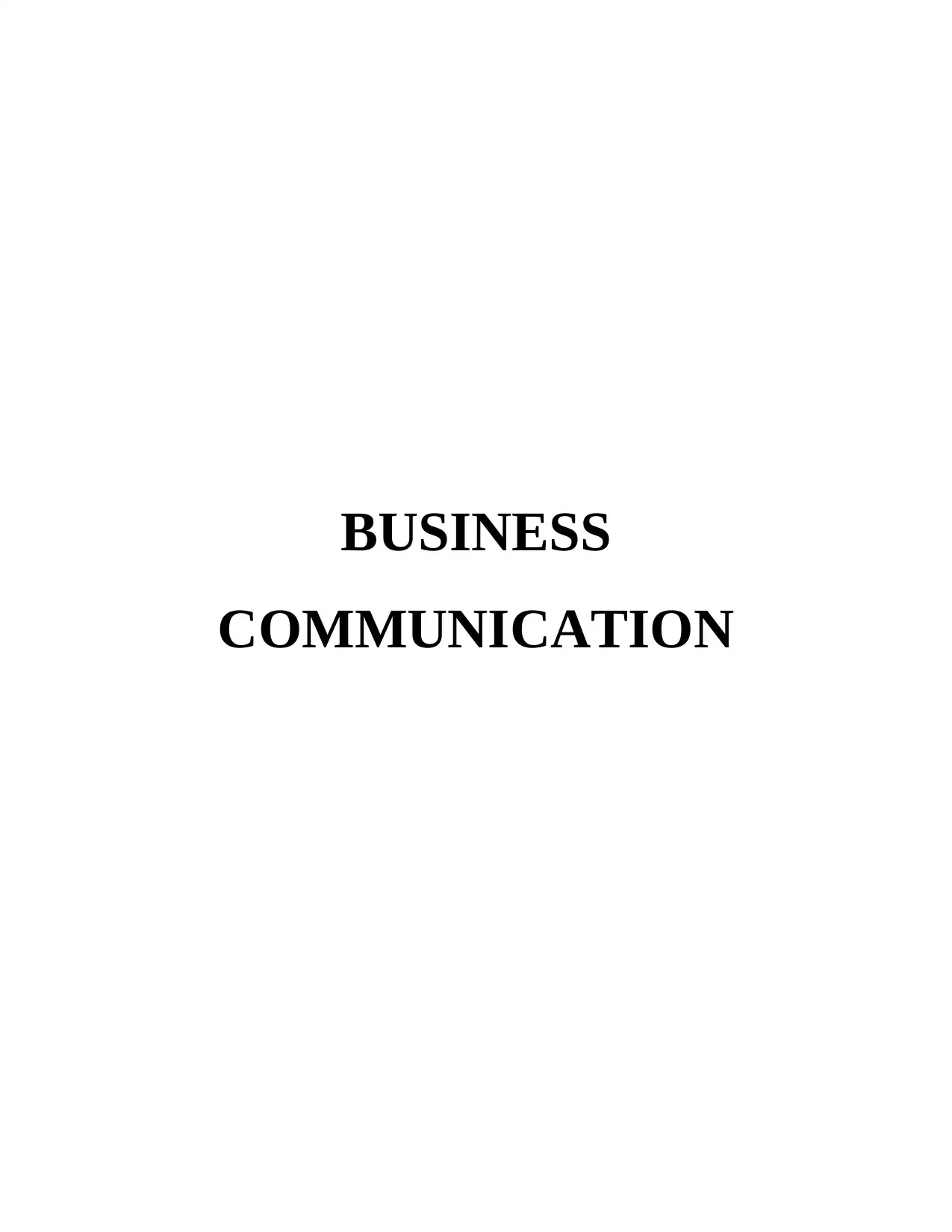
BUSINESS
COMMUNICATION
COMMUNICATION
Paraphrase This Document
Need a fresh take? Get an instant paraphrase of this document with our AI Paraphraser
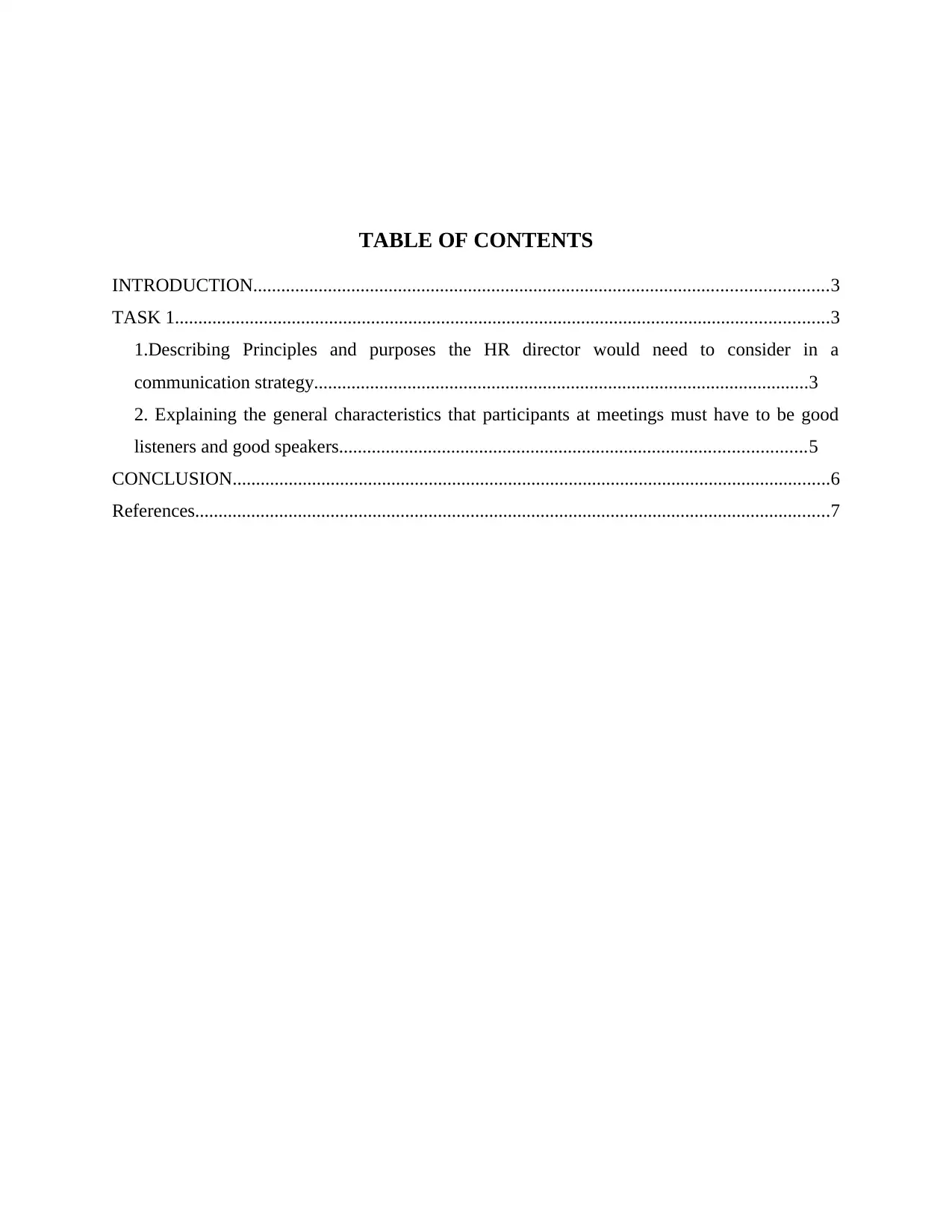
TABLE OF CONTENTS
INTRODUCTION...........................................................................................................................3
TASK 1............................................................................................................................................3
1.Describing Principles and purposes the HR director would need to consider in a
communication strategy..........................................................................................................3
2. Explaining the general characteristics that participants at meetings must have to be good
listeners and good speakers....................................................................................................5
CONCLUSION................................................................................................................................6
References........................................................................................................................................7
INTRODUCTION...........................................................................................................................3
TASK 1............................................................................................................................................3
1.Describing Principles and purposes the HR director would need to consider in a
communication strategy..........................................................................................................3
2. Explaining the general characteristics that participants at meetings must have to be good
listeners and good speakers....................................................................................................5
CONCLUSION................................................................................................................................6
References........................................................................................................................................7
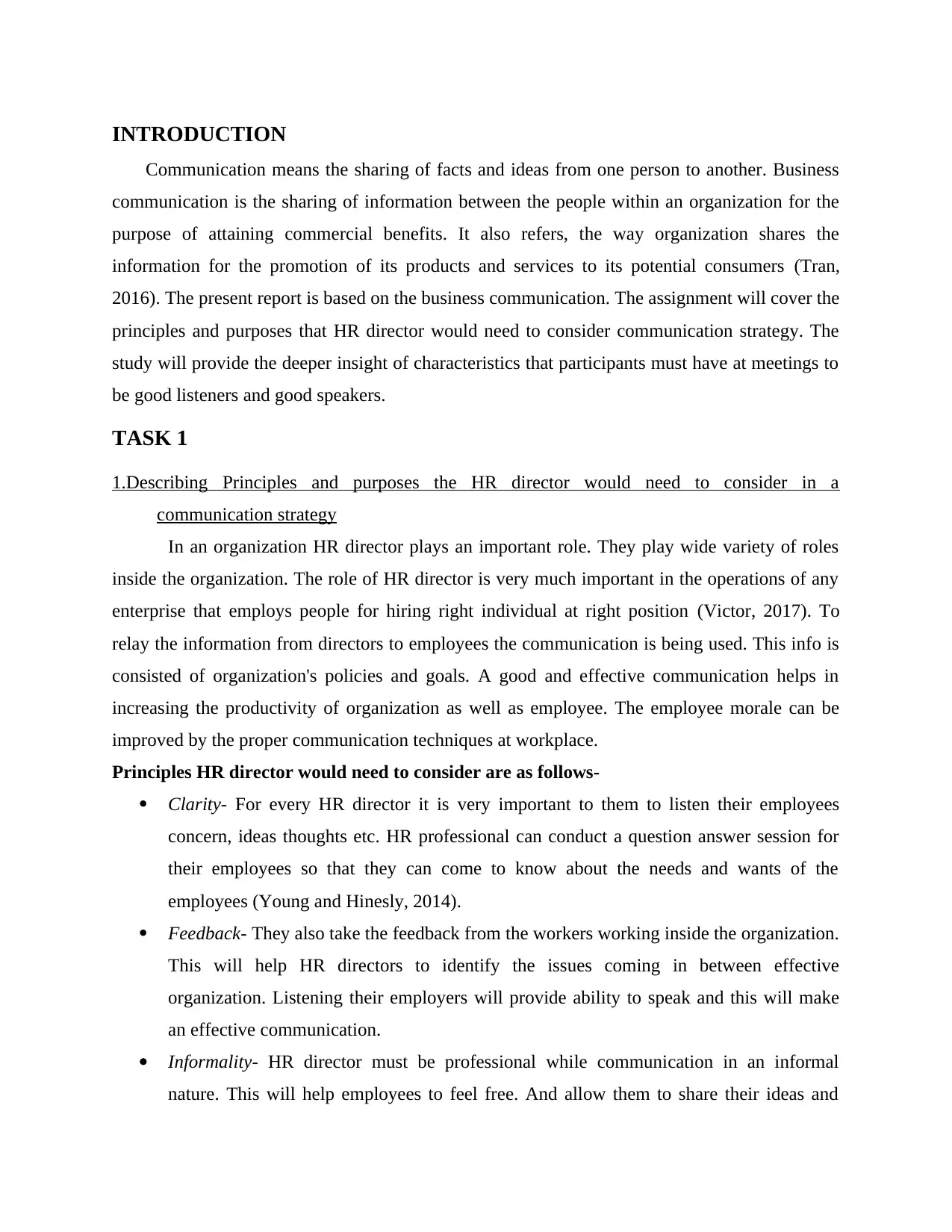
INTRODUCTION
Communication means the sharing of facts and ideas from one person to another. Business
communication is the sharing of information between the people within an organization for the
purpose of attaining commercial benefits. It also refers, the way organization shares the
information for the promotion of its products and services to its potential consumers (Tran,
2016). The present report is based on the business communication. The assignment will cover the
principles and purposes that HR director would need to consider communication strategy. The
study will provide the deeper insight of characteristics that participants must have at meetings to
be good listeners and good speakers.
TASK 1
1.Describing Principles and purposes the HR director would need to consider in a
communication strategy
In an organization HR director plays an important role. They play wide variety of roles
inside the organization. The role of HR director is very much important in the operations of any
enterprise that employs people for hiring right individual at right position (Victor, 2017). To
relay the information from directors to employees the communication is being used. This info is
consisted of organization's policies and goals. A good and effective communication helps in
increasing the productivity of organization as well as employee. The employee morale can be
improved by the proper communication techniques at workplace.
Principles HR director would need to consider are as follows-
Clarity- For every HR director it is very important to them to listen their employees
concern, ideas thoughts etc. HR professional can conduct a question answer session for
their employees so that they can come to know about the needs and wants of the
employees (Young and Hinesly, 2014).
Feedback- They also take the feedback from the workers working inside the organization.
This will help HR directors to identify the issues coming in between effective
organization. Listening their employers will provide ability to speak and this will make
an effective communication.
Informality- HR director must be professional while communication in an informal
nature. This will help employees to feel free. And allow them to share their ideas and
Communication means the sharing of facts and ideas from one person to another. Business
communication is the sharing of information between the people within an organization for the
purpose of attaining commercial benefits. It also refers, the way organization shares the
information for the promotion of its products and services to its potential consumers (Tran,
2016). The present report is based on the business communication. The assignment will cover the
principles and purposes that HR director would need to consider communication strategy. The
study will provide the deeper insight of characteristics that participants must have at meetings to
be good listeners and good speakers.
TASK 1
1.Describing Principles and purposes the HR director would need to consider in a
communication strategy
In an organization HR director plays an important role. They play wide variety of roles
inside the organization. The role of HR director is very much important in the operations of any
enterprise that employs people for hiring right individual at right position (Victor, 2017). To
relay the information from directors to employees the communication is being used. This info is
consisted of organization's policies and goals. A good and effective communication helps in
increasing the productivity of organization as well as employee. The employee morale can be
improved by the proper communication techniques at workplace.
Principles HR director would need to consider are as follows-
Clarity- For every HR director it is very important to them to listen their employees
concern, ideas thoughts etc. HR professional can conduct a question answer session for
their employees so that they can come to know about the needs and wants of the
employees (Young and Hinesly, 2014).
Feedback- They also take the feedback from the workers working inside the organization.
This will help HR directors to identify the issues coming in between effective
organization. Listening their employers will provide ability to speak and this will make
an effective communication.
Informality- HR director must be professional while communication in an informal
nature. This will help employees to feel free. And allow them to share their ideas and
⊘ This is a preview!⊘
Do you want full access?
Subscribe today to unlock all pages.

Trusted by 1+ million students worldwide
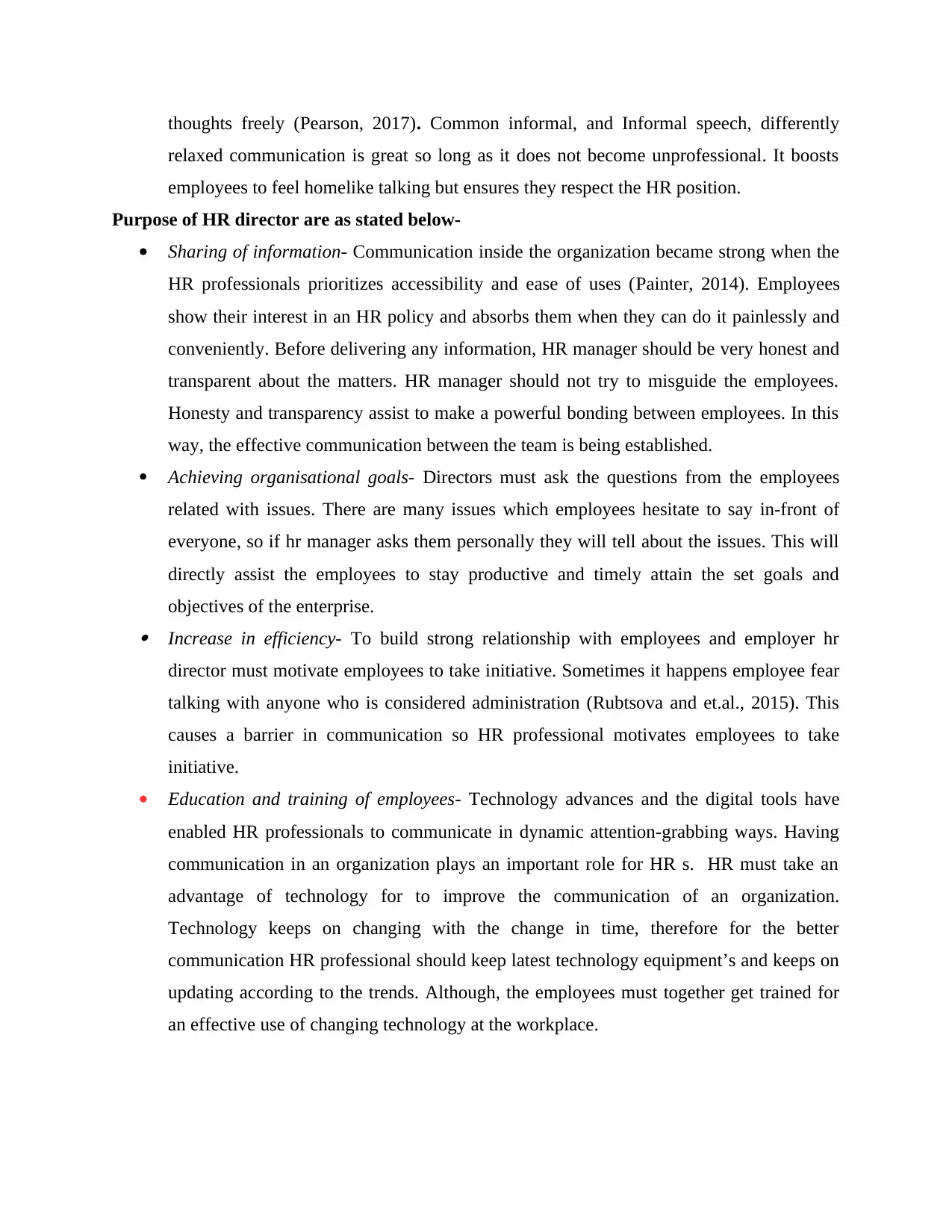
thoughts freely (Pearson, 2017). Common informal, and Informal speech, differently
relaxed communication is great so long as it does not become unprofessional. It boosts
employees to feel homelike talking but ensures they respect the HR position.
Purpose of HR director are as stated below-
Sharing of information- Communication inside the organization became strong when the
HR professionals prioritizes accessibility and ease of uses (Painter, 2014). Employees
show their interest in an HR policy and absorbs them when they can do it painlessly and
conveniently. Before delivering any information, HR manager should be very honest and
transparent about the matters. HR manager should not try to misguide the employees.
Honesty and transparency assist to make a powerful bonding between employees. In this
way, the effective communication between the team is being established.
Achieving organisational goals- Directors must ask the questions from the employees
related with issues. There are many issues which employees hesitate to say in-front of
everyone, so if hr manager asks them personally they will tell about the issues. This will
directly assist the employees to stay productive and timely attain the set goals and
objectives of the enterprise. Increase in efficiency- To build strong relationship with employees and employer hr
director must motivate employees to take initiative. Sometimes it happens employee fear
talking with anyone who is considered administration (Rubtsova and et.al., 2015). This
causes a barrier in communication so HR professional motivates employees to take
initiative.
Education and training of employees- Technology advances and the digital tools have
enabled HR professionals to communicate in dynamic attention-grabbing ways. Having
communication in an organization plays an important role for HR s. HR must take an
advantage of technology for to improve the communication of an organization.
Technology keeps on changing with the change in time, therefore for the better
communication HR professional should keep latest technology equipment’s and keeps on
updating according to the trends. Although, the employees must together get trained for
an effective use of changing technology at the workplace.
relaxed communication is great so long as it does not become unprofessional. It boosts
employees to feel homelike talking but ensures they respect the HR position.
Purpose of HR director are as stated below-
Sharing of information- Communication inside the organization became strong when the
HR professionals prioritizes accessibility and ease of uses (Painter, 2014). Employees
show their interest in an HR policy and absorbs them when they can do it painlessly and
conveniently. Before delivering any information, HR manager should be very honest and
transparent about the matters. HR manager should not try to misguide the employees.
Honesty and transparency assist to make a powerful bonding between employees. In this
way, the effective communication between the team is being established.
Achieving organisational goals- Directors must ask the questions from the employees
related with issues. There are many issues which employees hesitate to say in-front of
everyone, so if hr manager asks them personally they will tell about the issues. This will
directly assist the employees to stay productive and timely attain the set goals and
objectives of the enterprise. Increase in efficiency- To build strong relationship with employees and employer hr
director must motivate employees to take initiative. Sometimes it happens employee fear
talking with anyone who is considered administration (Rubtsova and et.al., 2015). This
causes a barrier in communication so HR professional motivates employees to take
initiative.
Education and training of employees- Technology advances and the digital tools have
enabled HR professionals to communicate in dynamic attention-grabbing ways. Having
communication in an organization plays an important role for HR s. HR must take an
advantage of technology for to improve the communication of an organization.
Technology keeps on changing with the change in time, therefore for the better
communication HR professional should keep latest technology equipment’s and keeps on
updating according to the trends. Although, the employees must together get trained for
an effective use of changing technology at the workplace.
Paraphrase This Document
Need a fresh take? Get an instant paraphrase of this document with our AI Paraphraser
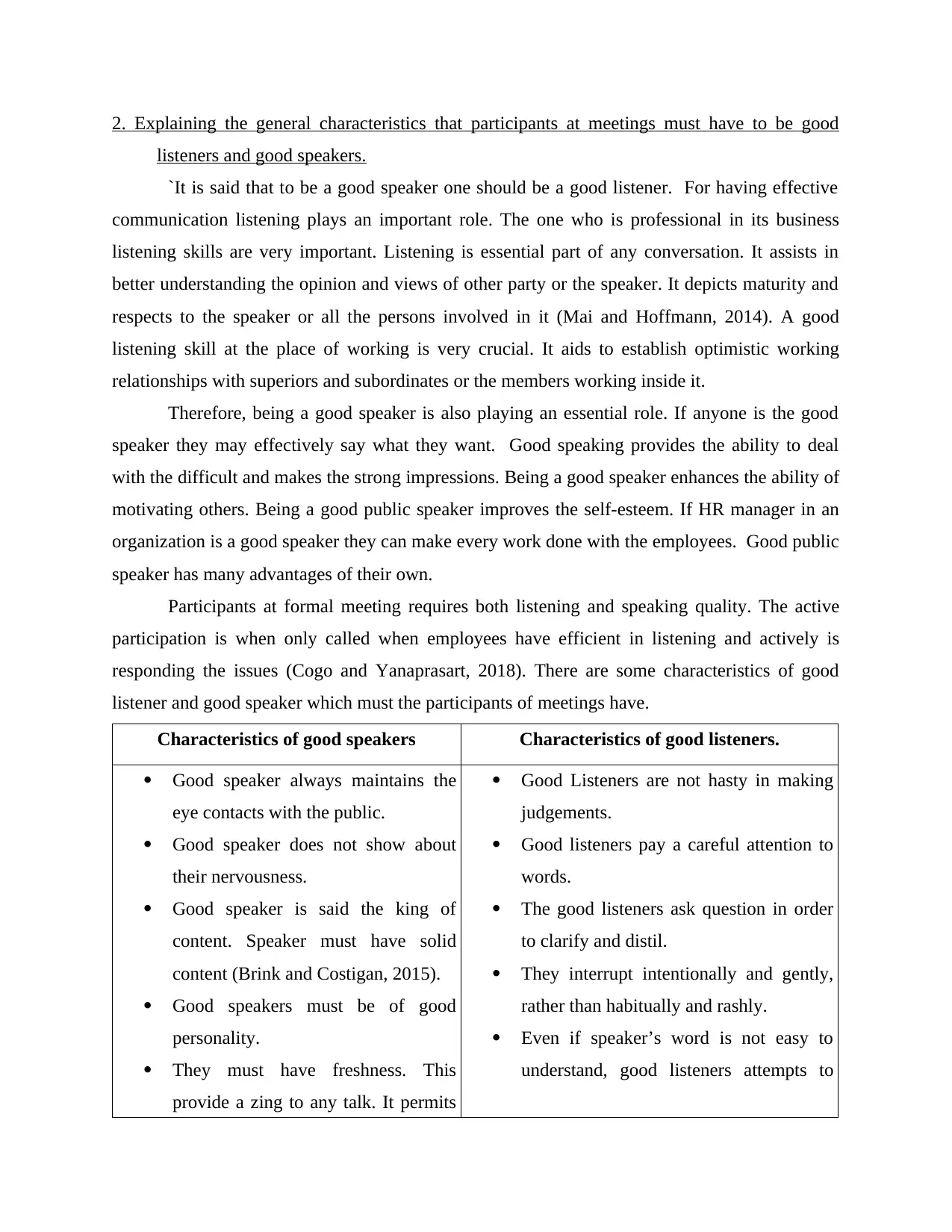
2. Explaining the general characteristics that participants at meetings must have to be good
listeners and good speakers.
`It is said that to be a good speaker one should be a good listener. For having effective
communication listening plays an important role. The one who is professional in its business
listening skills are very important. Listening is essential part of any conversation. It assists in
better understanding the opinion and views of other party or the speaker. It depicts maturity and
respects to the speaker or all the persons involved in it (Mai and Hoffmann, 2014). A good
listening skill at the place of working is very crucial. It aids to establish optimistic working
relationships with superiors and subordinates or the members working inside it.
Therefore, being a good speaker is also playing an essential role. If anyone is the good
speaker they may effectively say what they want. Good speaking provides the ability to deal
with the difficult and makes the strong impressions. Being a good speaker enhances the ability of
motivating others. Being a good public speaker improves the self-esteem. If HR manager in an
organization is a good speaker they can make every work done with the employees. Good public
speaker has many advantages of their own.
Participants at formal meeting requires both listening and speaking quality. The active
participation is when only called when employees have efficient in listening and actively is
responding the issues (Cogo and Yanaprasart, 2018). There are some characteristics of good
listener and good speaker which must the participants of meetings have.
Characteristics of good speakers Characteristics of good listeners.
Good speaker always maintains the
eye contacts with the public.
Good speaker does not show about
their nervousness.
Good speaker is said the king of
content. Speaker must have solid
content (Brink and Costigan, 2015).
Good speakers must be of good
personality.
They must have freshness. This
provide a zing to any talk. It permits
Good Listeners are not hasty in making
judgements.
Good listeners pay a careful attention to
words.
The good listeners ask question in order
to clarify and distil.
They interrupt intentionally and gently,
rather than habitually and rashly.
Even if speaker’s word is not easy to
understand, good listeners attempts to
listeners and good speakers.
`It is said that to be a good speaker one should be a good listener. For having effective
communication listening plays an important role. The one who is professional in its business
listening skills are very important. Listening is essential part of any conversation. It assists in
better understanding the opinion and views of other party or the speaker. It depicts maturity and
respects to the speaker or all the persons involved in it (Mai and Hoffmann, 2014). A good
listening skill at the place of working is very crucial. It aids to establish optimistic working
relationships with superiors and subordinates or the members working inside it.
Therefore, being a good speaker is also playing an essential role. If anyone is the good
speaker they may effectively say what they want. Good speaking provides the ability to deal
with the difficult and makes the strong impressions. Being a good speaker enhances the ability of
motivating others. Being a good public speaker improves the self-esteem. If HR manager in an
organization is a good speaker they can make every work done with the employees. Good public
speaker has many advantages of their own.
Participants at formal meeting requires both listening and speaking quality. The active
participation is when only called when employees have efficient in listening and actively is
responding the issues (Cogo and Yanaprasart, 2018). There are some characteristics of good
listener and good speaker which must the participants of meetings have.
Characteristics of good speakers Characteristics of good listeners.
Good speaker always maintains the
eye contacts with the public.
Good speaker does not show about
their nervousness.
Good speaker is said the king of
content. Speaker must have solid
content (Brink and Costigan, 2015).
Good speakers must be of good
personality.
They must have freshness. This
provide a zing to any talk. It permits
Good Listeners are not hasty in making
judgements.
Good listeners pay a careful attention to
words.
The good listeners ask question in order
to clarify and distil.
They interrupt intentionally and gently,
rather than habitually and rashly.
Even if speaker’s word is not easy to
understand, good listeners attempts to
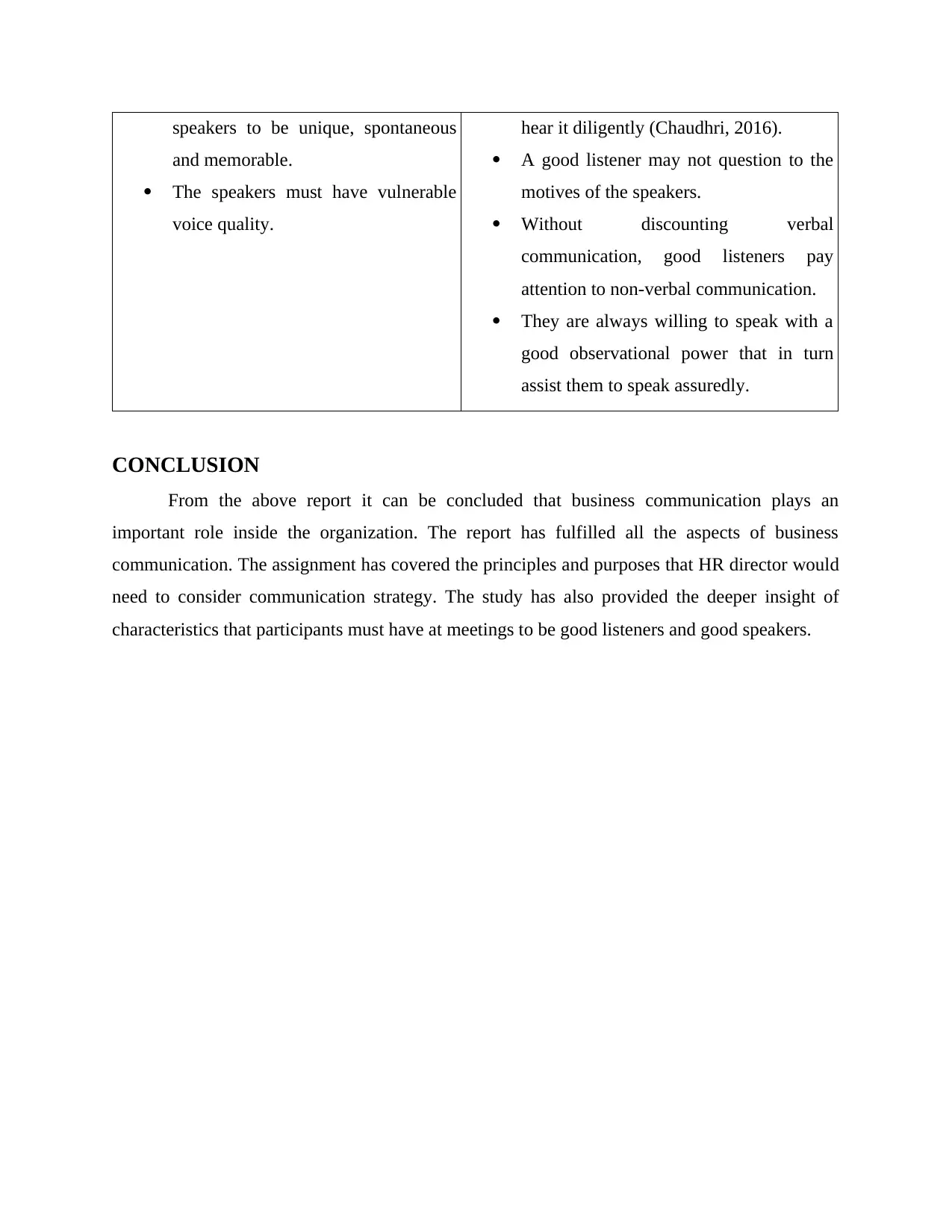
speakers to be unique, spontaneous
and memorable.
The speakers must have vulnerable
voice quality.
hear it diligently (Chaudhri, 2016).
A good listener may not question to the
motives of the speakers.
Without discounting verbal
communication, good listeners pay
attention to non-verbal communication.
They are always willing to speak with a
good observational power that in turn
assist them to speak assuredly.
CONCLUSION
From the above report it can be concluded that business communication plays an
important role inside the organization. The report has fulfilled all the aspects of business
communication. The assignment has covered the principles and purposes that HR director would
need to consider communication strategy. The study has also provided the deeper insight of
characteristics that participants must have at meetings to be good listeners and good speakers.
and memorable.
The speakers must have vulnerable
voice quality.
hear it diligently (Chaudhri, 2016).
A good listener may not question to the
motives of the speakers.
Without discounting verbal
communication, good listeners pay
attention to non-verbal communication.
They are always willing to speak with a
good observational power that in turn
assist them to speak assuredly.
CONCLUSION
From the above report it can be concluded that business communication plays an
important role inside the organization. The report has fulfilled all the aspects of business
communication. The assignment has covered the principles and purposes that HR director would
need to consider communication strategy. The study has also provided the deeper insight of
characteristics that participants must have at meetings to be good listeners and good speakers.
⊘ This is a preview!⊘
Do you want full access?
Subscribe today to unlock all pages.

Trusted by 1+ million students worldwide
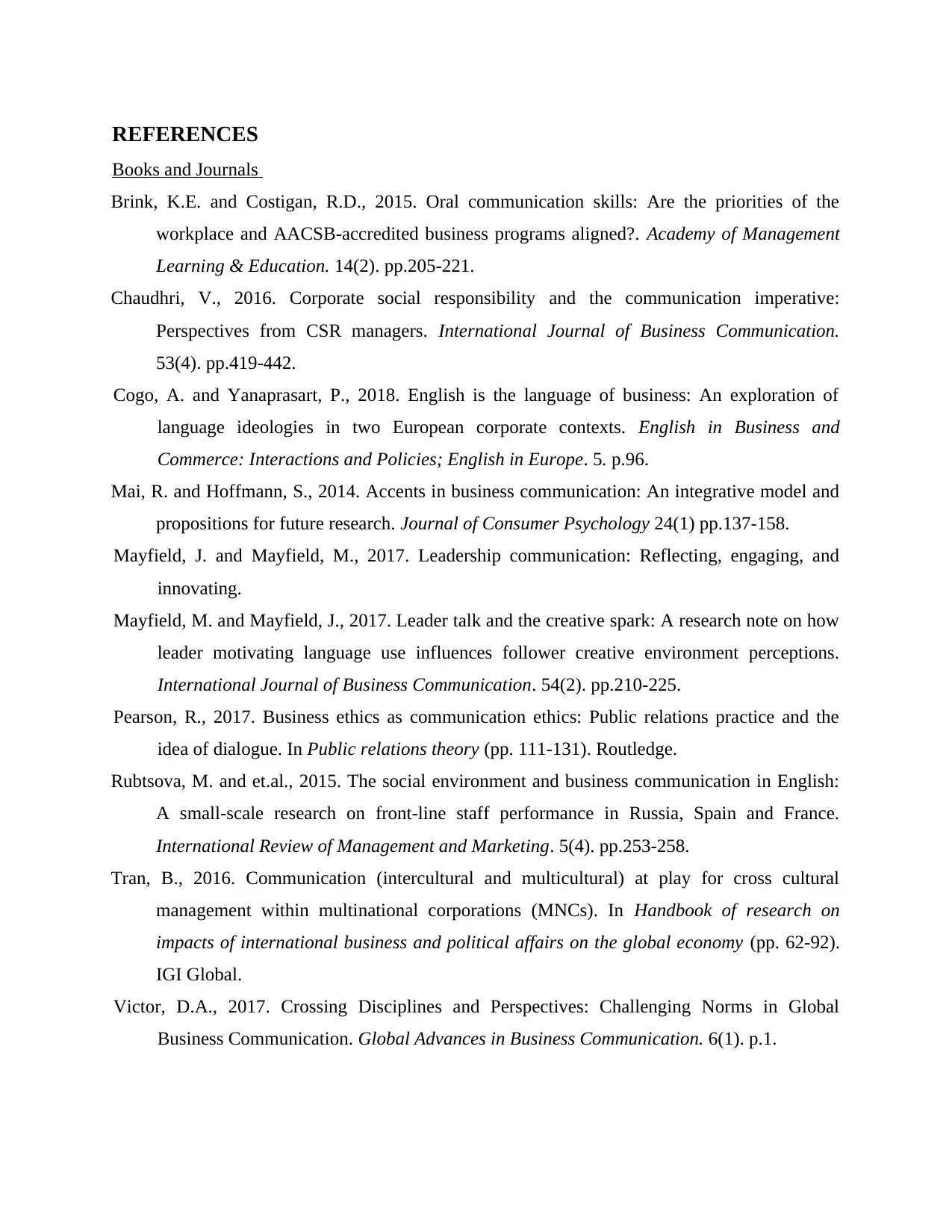
REFERENCES
Books and Journals
Brink, K.E. and Costigan, R.D., 2015. Oral communication skills: Are the priorities of the
workplace and AACSB-accredited business programs aligned?. Academy of Management
Learning & Education. 14(2). pp.205-221.
Chaudhri, V., 2016. Corporate social responsibility and the communication imperative:
Perspectives from CSR managers. International Journal of Business Communication.
53(4). pp.419-442.
Cogo, A. and Yanaprasart, P., 2018. English is the language of business: An exploration of
language ideologies in two European corporate contexts. English in Business and
Commerce: Interactions and Policies; English in Europe. 5. p.96.
Mai, R. and Hoffmann, S., 2014. Accents in business communication: An integrative model and
propositions for future research. Journal of Consumer Psychology 24(1) pp.137-158.
Mayfield, J. and Mayfield, M., 2017. Leadership communication: Reflecting, engaging, and
innovating.
Mayfield, M. and Mayfield, J., 2017. Leader talk and the creative spark: A research note on how
leader motivating language use influences follower creative environment perceptions.
International Journal of Business Communication. 54(2). pp.210-225.
Pearson, R., 2017. Business ethics as communication ethics: Public relations practice and the
idea of dialogue. In Public relations theory (pp. 111-131). Routledge.
Rubtsova, M. and et.al., 2015. The social environment and business communication in English:
A small-scale research on front-line staff performance in Russia, Spain and France.
International Review of Management and Marketing. 5(4). pp.253-258.
Tran, B., 2016. Communication (intercultural and multicultural) at play for cross cultural
management within multinational corporations (MNCs). In Handbook of research on
impacts of international business and political affairs on the global economy (pp. 62-92).
IGI Global.
Victor, D.A., 2017. Crossing Disciplines and Perspectives: Challenging Norms in Global
Business Communication. Global Advances in Business Communication. 6(1). p.1.
Books and Journals
Brink, K.E. and Costigan, R.D., 2015. Oral communication skills: Are the priorities of the
workplace and AACSB-accredited business programs aligned?. Academy of Management
Learning & Education. 14(2). pp.205-221.
Chaudhri, V., 2016. Corporate social responsibility and the communication imperative:
Perspectives from CSR managers. International Journal of Business Communication.
53(4). pp.419-442.
Cogo, A. and Yanaprasart, P., 2018. English is the language of business: An exploration of
language ideologies in two European corporate contexts. English in Business and
Commerce: Interactions and Policies; English in Europe. 5. p.96.
Mai, R. and Hoffmann, S., 2014. Accents in business communication: An integrative model and
propositions for future research. Journal of Consumer Psychology 24(1) pp.137-158.
Mayfield, J. and Mayfield, M., 2017. Leadership communication: Reflecting, engaging, and
innovating.
Mayfield, M. and Mayfield, J., 2017. Leader talk and the creative spark: A research note on how
leader motivating language use influences follower creative environment perceptions.
International Journal of Business Communication. 54(2). pp.210-225.
Pearson, R., 2017. Business ethics as communication ethics: Public relations practice and the
idea of dialogue. In Public relations theory (pp. 111-131). Routledge.
Rubtsova, M. and et.al., 2015. The social environment and business communication in English:
A small-scale research on front-line staff performance in Russia, Spain and France.
International Review of Management and Marketing. 5(4). pp.253-258.
Tran, B., 2016. Communication (intercultural and multicultural) at play for cross cultural
management within multinational corporations (MNCs). In Handbook of research on
impacts of international business and political affairs on the global economy (pp. 62-92).
IGI Global.
Victor, D.A., 2017. Crossing Disciplines and Perspectives: Challenging Norms in Global
Business Communication. Global Advances in Business Communication. 6(1). p.1.
Paraphrase This Document
Need a fresh take? Get an instant paraphrase of this document with our AI Paraphraser
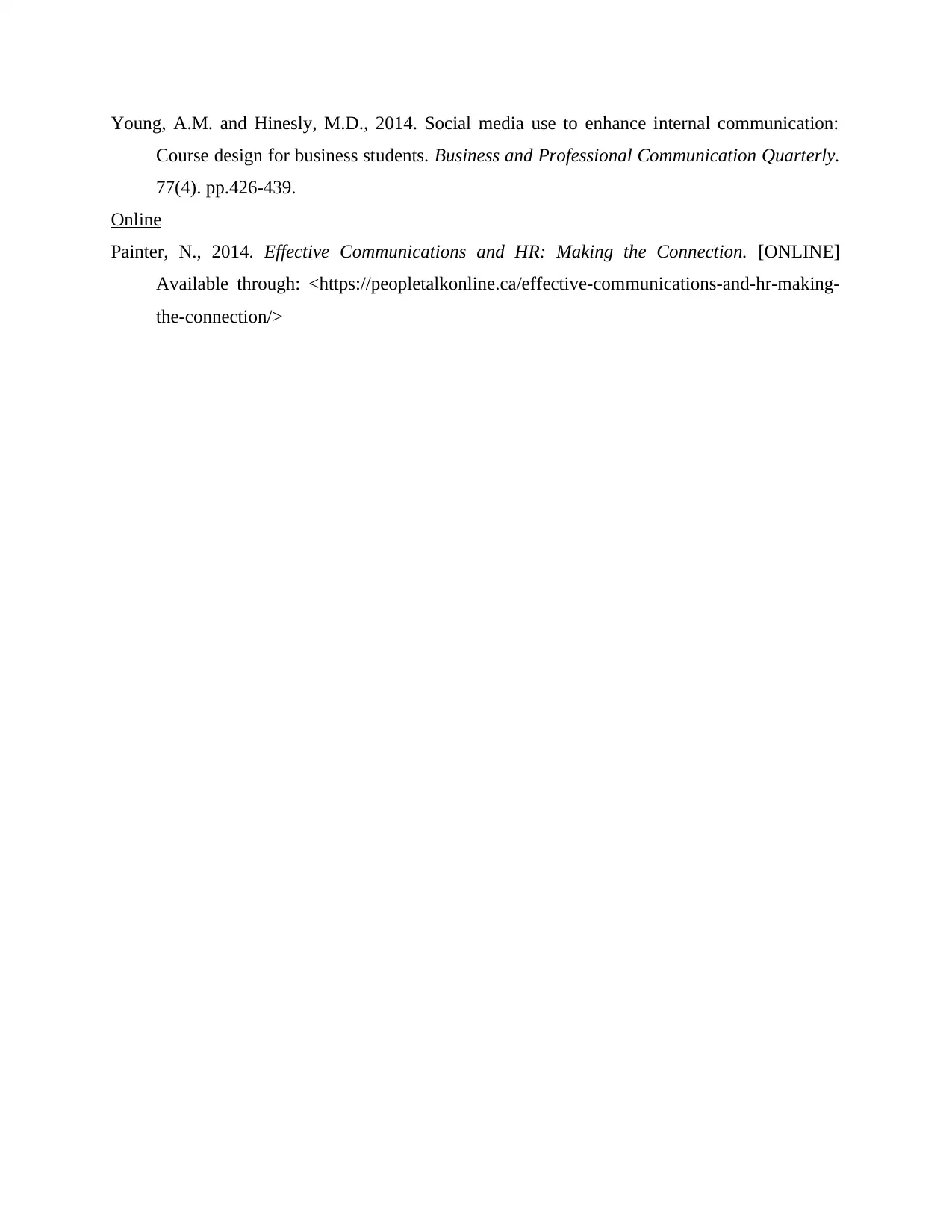
Young, A.M. and Hinesly, M.D., 2014. Social media use to enhance internal communication:
Course design for business students. Business and Professional Communication Quarterly.
77(4). pp.426-439.
Online
Painter, N., 2014. Effective Communications and HR: Making the Connection. [ONLINE]
Available through: <https://peopletalkonline.ca/effective-communications-and-hr-making-
the-connection/>
Course design for business students. Business and Professional Communication Quarterly.
77(4). pp.426-439.
Online
Painter, N., 2014. Effective Communications and HR: Making the Connection. [ONLINE]
Available through: <https://peopletalkonline.ca/effective-communications-and-hr-making-
the-connection/>

⊘ This is a preview!⊘
Do you want full access?
Subscribe today to unlock all pages.

Trusted by 1+ million students worldwide

1 out of 10
Related Documents
Your All-in-One AI-Powered Toolkit for Academic Success.
+13062052269
info@desklib.com
Available 24*7 on WhatsApp / Email
![[object Object]](/_next/static/media/star-bottom.7253800d.svg)
Unlock your academic potential
Copyright © 2020–2026 A2Z Services. All Rights Reserved. Developed and managed by ZUCOL.





